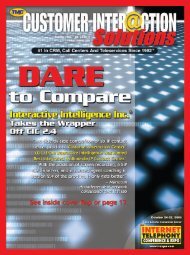service provider news - TMC's Digital Magazine Issues
service provider news - TMC's Digital Magazine Issues
service provider news - TMC's Digital Magazine Issues
- No tags were found...
Create successful ePaper yourself
Turn your PDF publications into a flip-book with our unique Google optimized e-Paper software.
Disaster PreparednessBy Rich Tehrani & Max SchroederPersonal DR PlansVoIP, FoIP, unifiedcommunications,SaaS andother hosted<strong>service</strong>s providethe tools for a mobile workforce. Home offices, once a rarity,are now an indispensable component of many businessoperations. An added benefit is a built-in business continuity/disasterrecovery strategy. Employee dispersion reducesthe risk of business disruptions caused by fire, power outagesand other problems. However, it does not eliminate the risksentirely. Smaller companies are particularly vulnerable asmany employees reside in the same community or region asthe primary company office.Since most business interruptions last less than 72 hours,total relocation time is critical for maximum efficiency. Roadwarriors usually have portable offices at the ready. However,stationary home office employees will not be as mobile unlesstheir company has provided a clear plan and the proper equipment.Senior management is usually focused on data preservation,maintaining communications and other centralizedissues, so personal BC/DR planning can easily be overlooked.Plus, many managers are also road warriors and simply assumetheir critical employees are equally prepared.To get started, identify your critical employee home office locationsin relation to your company offices. Step two is to identifyhotels for your team outside of a defined radius with a secondarylocation at a greater distance. Most hotels provide high-speedaccess in their rooms and a business center, but do not take thesefor granted. You may also want to consider making arrangementswith hotel management to guarantee a number of rooms for yourcompany. Space can disappear quickly in an emergency. If theemergency is of a longer duration than 72 hours, you easily canmake adjustments, as your team already will be fully operationaland in communications with management.One of this column’s authors, Max Schroeder, recently experiencedhis second storm-related power outage in two years.Within an hour, Max was at his designated BC/DR hotel andfully operational. Putting a company BC/DR plan in placeis not complicated and generally pays for itself quickly inimproving overall company efficiencies, but it does require youto get it done – no time like now to start. ITMax Schroeder is the senior vice president of FaxCore Inc. (www.faxcore.com ) and managing director of the DPCF.Rich Tehrani is the CEO and group editor-in-chief at TMC, andconference chairman of ITEXPO.Regulation WatchBy William B. Wilhelm and Jeffrey R. StrenkowskiFCC Imposes Network Neutrality Rules onBroadband ProvidersOn Dec. 21, 2010,the FCC votedto approve rulesaimed at “preserving the open Internet” (i.e., network neutralityrules). As expected, the FCC voted to impose transparency, nondiscriminationand a no-blocking rule on broadband <strong>provider</strong>s.The rules require wireline broadband <strong>service</strong> <strong>provider</strong>s to treatlawful content in a “nondiscriminatory” manner. Likewise,<strong>service</strong> <strong>provider</strong>s will be prohibited from blocking legal content,applications, <strong>service</strong>s, and non-harmful devices. Broadband<strong>service</strong> <strong>provider</strong>s also will be required to disclose their networkmanagement, performance characteristics, and commercialterms of their offerings. All of the new rules are subject to anexception for “reasonable network management.”The rules also do not specifically ban the practice of paidprioritization, but the FCC has stated that the practice isnot likely to be considered “reasonable.” The FCC willconsider that practice, and others, on a case-by-case basis,with the burden on the <strong>service</strong> <strong>provider</strong> to prove that thepractice is “reasonable.” The rules will not strictly prohibittiered pricing for consumer broadband access, but the FCCintends to monitor the practice.While not treated identically to wireline <strong>service</strong>s, wirelessbroadband <strong>service</strong>s will be subject to several open Internetrules as well, including a requirement to disclose networkmanagement practices, including device and application certificationprocedures and the criteria for placing restrictions on<strong>service</strong>s or applications. The rules also prohibit the blocking ofwebsites as well as access to applications that compete with thebroadband <strong>provider</strong>’s voice or video <strong>service</strong>s.A number of members of Congress have announced theiropposition to the new rules, and it is expected that this debatewill continue into 2011 and beyond. ITWilliam B. Wilhelm is a partner and Jeffrey R. Strenkowskiis counsel at the global law firm of Bingham McCutchen LLP(www.bingham.com).GoTo:8 INTERNET TELEPHONY ® February 2011 Table of Contents • Ad IndexSubscribe FREE online at www.itmag.comGoTo:









